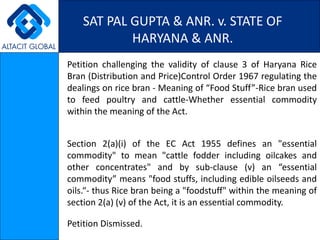Essential commodities
- 1. ESSENTIAL COMMODITIES DHANYA N. MENON ADVOCATE E mail: ip@altacit.com ; Website: www. altacit.com
- 2. WHAT ARE ESSENTIAL COMMODITIES? Those declared by the Central Government as EC The Essential Commodities Act, 1955 Implemented by the State Governments and Union Territories – Delegated Powers under the Act.
- 3. LIST OF ESSENTIAL COMMODITIES At present: Only 7 broad categories Drugs; Fertilizer, inorganic, organic or mixed; Foodstuffs, including edible oilseeds and oils; Hank yarn made wholly from cotton; Petroleum and petroleum products; Raw jute and jute textile; Seeds: (i) seeds of food-crops and seeds of fruits and vegetables; (ii) seeds of cattle fodder; and (iii) jute seeds. Recently cotton seed was also included in the list
- 4. ESSENTIAL COMMODITIES ACT, 1955 To ensure the easy availability of essential commodities to consumers ; To protect consumers from exploitation by unscrupulous traders ; For the regulation and control of production, distribution and pricing of commodities which are declared as essential for – maintaining or increasing supplies; securing their equitable distribution; and securing availability at fair prices.
- 5. ACT – CHECKING PRICE HIKE State and UT administrations Impose stock or turnover limits for various commodities Penalize those who hold in excess of the limit. Stock limits have been imposed in several states for pulses, edible oil, edible oilseeds, rice, paddy and sugar.
- 6. POWERS UNDER THE ACT Section 3 – Power of Central Government Regulate or prohibit the production, supply and distribution, trade and commerce of any essential commodity regulate by licenses, permits or otherwise: the production or manufacture of any essential commodity storage, transport, distribution, disposal, acquisition, consumption Cultivate food crops on any waste land prohibit the withholding from sale of any essential commodity ordinarily kept for sale
- 7. CONFISCATION OF ESSENTIAL COMMODITY ECs seized u/s. 3 shall be produced before the District Collector If the Collector is satisfied that there has been a contravention of the order may order confiscation of- (a) the essential commodity so seized; (b) any package, covering or receptacle in which such essential commodity is found; and (c) any animal, vehicle, vessel or other conveyance used in carrying such essential commodity; the person from whom it is seized is given a show cause notice informing the grounds of confiscation Any person aggrieved may, within one month of such order, appeal to the State Government.
- 8. PENALTIES: SECTION 7 If any person contravenes any order made under Sec 3: imprisonment for a term which may extend from three months to seven years and shall also be liable to fine any property in respect of which the order has been contravened shall be forfeited to the Government. any packing, covering or receptacle in which the property is found and any animal, vehicle or other conveyance used in carrying the property shall, if the court so orders, be forfeited to the Government.
- 9. ACCUSED PERSON Any person who attempts to contravene or abets a contravention of any order made u/S. 3 Any person who furnish false statement or wrong information u/S. 3 In case if the contravention is by the Company: every person who, at the time the contravention was committed was in charge of and was responsible to the company for the conduct of the business of the company as well as company
- 10. OFFENCES All offences are cognizable and non- bailable No court shall take cognizance of any offence punishable under this Act except on a report in writing of the facts constituting such offence made by a public servant or any person aggrieved or any recognized consumer association all offences shall be trialed only by the Special Court constituted for the area All trial should be summary trials Appeal lie to the High Court
- 11. JAFFER v. THE STATE OF KERALA (MARCH, 2010) Cognizance for the offence u/Secs 3 and 7 of EC Act - petitioner was found manufacturing engine oil without license using chemicals for storing and sale-contention declared engine oil has not declared as an essential commodity and therefore petitioner cannot be prosecuted for the offence u/Secs 3 and 7 of EC Act. Section 3 empowers to control production, supply, distribution etc. of essential commodities. The prosecution quashed.
- 12. STATE (DELHI ADMINISTRATION) v. VIJAY CHAUDHARI (NOVEMBER 2006) Cognizance u/S 7 of the EC Act. Respondent-proprietor of fair price shop-raid by food department-discrepancies in stocks-prosecuted-trial court acquitted-Appeal. Since no evidence to prove that the respondent was the license holder of the fair price shop he cannot be convicted. Acquittal sustained- Appeal dismissed.
- 13. SAT PAL GUPTA & ANR. v. STATE OF HARYANA & ANR. Petition challenging the validity of clause 3 of Haryana Rice Bran (Distribution and Price)Control Order 1967 regulating the dealings on rice bran - Meaning of “Food Stuff”-Rice bran used to feed poultry and cattle-Whether essential commodity within the meaning of the Act. Section 2(a)(i) of the EC Act 1955 defines an "essential commodity" to mean "cattle fodder including oilcakes and other concentrates" and by sub-clause (v) an “essential commodity” means "food stuffs, including edible oilseeds and oils.“- thus Rice bran being a "foodstuff" within the meaning of section 2(a) (v) of the Act, it is an essential commodity. Petition Dismissed.
Editor's Notes
- © Altacit Global 2009 Email: info@altacit.com













